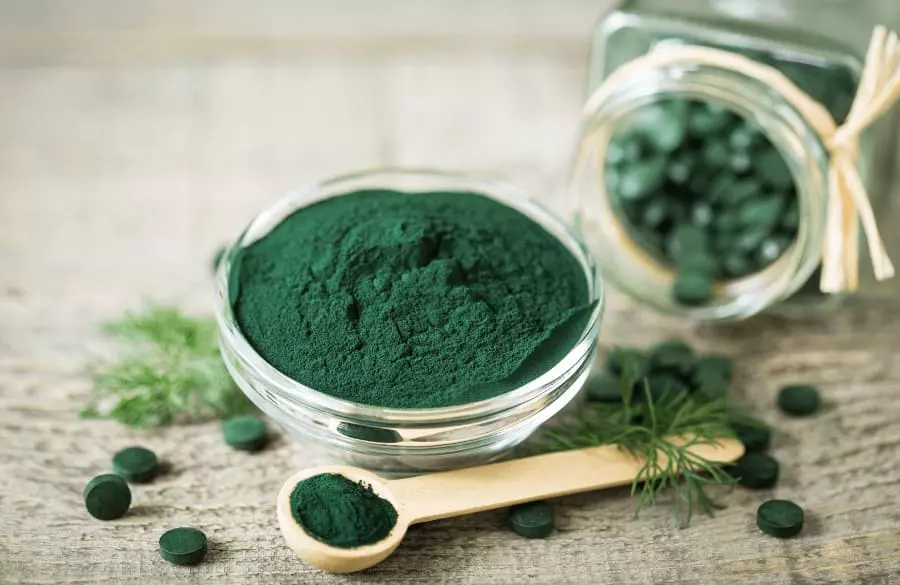
As pet owners, we do everything we can to keep our pets happy and healthy, but as our dogs inevitably age, it gets more and more challenging to ensure they stay in tip-top shape. Spirulina for dogs is one up-and-coming natural health aid that can help your old dog fight some of the effects of aging.
What is Spirulina and Chlorella for Dogs?
Spirulina is an algae that grows naturally in freshwater lakes, rivers, and ponds and is commonly used in a variety of natural remedies. This single-celled protein can often be seen in environments that have moderate temperatures and high levels of sunlight.
Though it initially became popular as a human supplement, spirulina can be used to support senior pets too, offering a variety of health benefits, including relief for bad breath.
This is also due to the algae’s various properties which help to support, manage and prevent many common old dog issues when added to animal diets. Seems like kelp isn’t the only healthy algae good for dogs!
Though spirulina supplements are widely available for humans, there are only a few brands on the market geared towards pets. For example, Thrive Tri-Mineral Boost contains a mixture of spirulina, kelp, and alfalfa to offer your dog a variety of nutrients and benefits.
Chlorella is a green algae that is higher in fat content and calories than spirulina. Chlorella is often used in unison with spirulina via tablets and other forms of vitamins, and also Chlorella is high in amino acids like omega-3 and nucleic acid.
While there are many benefits of chlorella for dogs, nausea, gas, and diarrhea can occur when given in large quantities.
Some human spirulina and chlorella supplements are safe for dogs too. Check out this guide to spirulina supplements for people. Just make sure to read the full ingredient list to make sure all ingredients are dog-safe. In the end, the effect that chlorella and spirulina can have on your dog's body is impressive and diverse.
5 Benefits of Spirulina for Dogs
So what is the spirulina craze all about anyway? Let’s take a look at the 5 best benefits of spirulina for dogs:
1. Spirulina supplements are highly nutritious
Spirulina itself is widely recognized as a superfood and can be added to your dog’s daily diet to boost overall health and wellness. The reason for this is the supplements’ excellent source of protein, B vitamins, and essential fatty acids which boost your dog’s immune system.
According to the Veterinarian Dr. L. Wakefield (2020), Spirulina contains many essential fatty acids, especially GLA (gamma-linolenic acid). GLA is an omega-6 fatty acid with powerful anti-inflammatory properties that can support skin + coat, digestion, and mobility.
2. Spirulina supplements are full of antioxidants
Spirulina is rich in Vitamins E and C, both of which are known to reduce inflammation and ease discomfort in elderly dogs, but these antioxidants protect your dog from a cellular level. Since spirulina is full of antioxidants, it is beneficial to dogs with allergies, cancer, and heart disease by protecting against disease-causing free radical cells.
3. Spirulina supplements can improve your dog’s digestion
One of the problems that elderly dogs undoubtedly face is the inability to digest their food properly due to declining digestive function. Fortunately, Spirulina supplements are discovered to aid in boosting metabolism and help energy levels. Along with its antioxidant properties, studies have shown that Spirulina can aid in your dog’s digestion with its very high fibre content. This can regulate the speed of digestion and lead to better nutrient absorption.
4. Spirulina supplements can improve skin and coat health

A dog’s skin and coat health are one of the first indicators of a healthy dog. If you’ve noticed your old dog is starting to look dry and dull, then he may need some extra skin and coat support. Luckily, Best spirulina for dogs contains properties that play a big role in cleansing your dog’s skin and coat.
The supplement contains a great source of essential fatty acids which help to condition his skin and coat and leave a soft, shiny, youthful-looking dog.
5. Spirulina supplements can strengthen your dog’s immune system
Last but not the least, Spirulina for dogs can strengthen their immunity. For elderly dogs, immunity is the front line against age-related disease and illness. Maintaining a healthy immune system will support your dog’s overall health. Since it’s so jam-packed with nutrients and vitamins, it is no surprise that Spirulina supplements are known and understood to have immunity-boosting effects for dogs. It can enhance the body’s ability to adapt to changes and create new antibodies.
How to Feed Spirulina to Your Dog
While we may find the taste of pure spirulina to be a little off-putting, the naturally fishy odour and taste are typically appealing to dogs. It’s as easy as mixing the spirulina powder right into their regular meals.
If your dog is a bit picky, you may need to get clever about sneaking this supplement into their diet. Here are a few easy tricks to feed spirulina without your dog catching on:
1. Wet Food
If you normally feed dry senior dog food like kibble, then you may want to consider offering a treat of wet food on the side. Any powdered or liquid supplements will blend into the flavourful food, masking the taste.
2. Frozen Treats
Making your dog's goodies from scratch isn’t for everyone, especially if you're not particularly adept in the kitchen, but frozen treats are fool-proof. Check out our favourite frozen dog treat recipes to find a winner, and simply add your spirulina into the recipe.
3. Bone Broth
Bone broth is loaded with nutrients, and dogs go crazy for it. You can add your spirulina for dogs into your favourite bone broth recipe or product and feed as a side dish or pour it over any meal for an extra tasty surprise.
4. Pill Treats
If your dog is a master at detecting food medications, you may want to consider using a pill treat to conceal the herbal supplement. These soft and chewy treats are hollow and can be pinched at the ends to lock in medications and supplements. Then just toss the treat to your dog. He won’t even know it’s in training.
Choosing the Right Spirulina Supplement for Dogs
Now that you’re well informed about the benefits that Spirulina supplements for your elderly dogs, it is important to be knowledgeable about the best brands and products available. If you can’t find a pet-specific spirulina supplement, then go see this page to find some of the best Spirulina supplements made for human use.
Since Spirulina can help in many different ways when it comes to your dog’s health, it is a highly recommended supplement for senior pets but can be beneficial to dogs of any age. Make sure you follow the dosage instructions to avoid offering too many vitamins and minerals.
Frequently Asked Questions
What are Spirulina and Chlorella, and how can they benefit senior dogs?
Spirulina and Chlorella are nutrient-rich algae that can provide senior dogs with essential vitamins, minerals, and antioxidants, supporting their overall health and vitality.
Are Spirulina and Chlorella safe for senior dogs to consume?
Yes, Spirulina and Chlorella are generally considered safe for senior dogs when administered in appropriate doses.
How can Spirulina and Chlorella help with joint health in senior dogs?
These algae contain anti-inflammatory properties that may aid in reducing joint inflammation and discomfort in senior dogs, potentially improving their mobility and comfort.
Can Spirulina and Chlorella support the immune system of senior dogs?
Yes, both Spirulina and Chlorella contain immune-boosting antioxidants that can help enhance the immune system's function in senior dogs, helping them combat illnesses more effectively.
Are there any potential side effects or contraindications for using Spirulina and Chlorella in senior dogs?
While these supplements are generally safe, some dogs may experience mild gastrointestinal upset when first introduced.
How should Spirulina and Chlorella be administered to senior dogs, and what is the recommended dosage?
The appropriate dosage of Spirulina and Chlorella can vary based on your dog's size and specific needs. The easiest format is in treat form, but powdered supplements can be added to food and are typically more potent. 
.png?width=200&height=66&name=logo%20(1).png)




